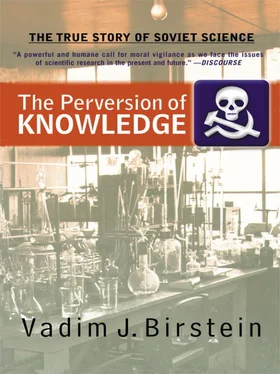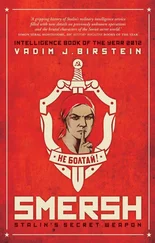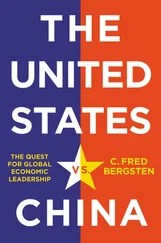Stalin read the letter, and the original bears Stalin’s note: “To the members of the PB. St.[alin].” The letter was immediately copied (on April 5, 1935) and given to all members of and candidates to the Politburo, as well as to the state security commissar of the time, Nikolai Yezhov. 147Apparently, the letter was the reason that Bondarenko was arrested in 1941 and investigated in connection with Vavilov. It is known now that during interrogations he signed testimonies against the cytogeneticist Grigory Levitsky, who was later arrested. 148
On February 18, 1941, Vavilov signed a document entitled “What I Know About Aleksandr Stepanovich Bondarenko.” 149Numerous standard bureaucratic NKVD expressions such as “wrecking activity” and “wrecking selection of the cadres to the leading positions within the Academy” reveal that this document was, apparently, prepared by Khvat. Bondarenko was described in it as a protégé of Commissar Yakovlev, who had already been executed. Also, this document mentioned, among others, Director of the Institute of Agrochemistry and Agrotechnique Anton Zaporozhets, whom Vavilov hardly knew. Soon Zaporozhets and Professor Boris Panshin (director of the All-Union Institute of Sugar Beets located in Kiev), whose name cropped up during many previous interrogations of Vavilov, were also arrested. 150On March 3, 1941, Vavilov was interrogated regarding both Bondarenko and Zaporozhets. 151
In March 1941, Khvat concentrated his efforts on forcing Vavilov to admit that he had spied for different Western countries. 152Vavilov strongly denied this accusation: “I did not have espionage contacts with anybody.”
At this point Khvat decided to use another NKVD tactic—a stool pigeon, Prokopy Lobov, was put in Vavilov’s cell. On March 21, 1941, Lobov wrote a letter addressed to the Investigation Directorate in which he described Vavilov as “a convinced enemy of the Soviet Power.” 153On April 24, Senior Investigator Marisou of the First Department of the NKGB Investigation Directorate interrogated Lobov regarding Vavilov. 154Evidently, most of the text of the minutes was written by the interrogator himself. It is difficult to believe that a simple peasant like Lobov would have knowledge of so many scientists and their problems.
Finally, Khvat decided (or was ordered) to create a commission of scientific experts who would evaluate “the wrecking activity” of Vavilov. He suggested that this commission would be approved by Lysenko and Commissar of Agriculture Benediktov. Vlodzimersky approved Khvat’s idea. 155Lysenko received the following letter from deputy NKGB commissar Kobulov:
USSR People’s Commissariat of State Security
May 5, 1941
No. _____
Moscow
To: President of the Lenin All-Union Academy of Agriculture Com.[rade] LYSENKO
Because of the necessity to create an expert commission for documentation of the wrecking activity of the arrested former Director of the All-Union Institute of Plant Breeding, Academician Vavilov N. I., I ask you to agree to include the following candidates in the expert commission:
MOSOLOV, V. P., Vice President of the Lenin All-Union Academy of Agriculture [Lysenko’s deputy]
CHUENKOV, S. V., Deputy Commissar of Agriculture
YAKUSHKIN, I. V., Academician of the Academy of Sciences and of Lenin All-Union Academy of Agriculture [an NKVD informer]
VODKOV, A. P., Deputy Head of the Glavsortupr [Main Directorate of Seed Varieties] of Narkomzem [Commissariat of Agriculture] of the USSR
ZUBAREV, A. K., Scientific Secretary of the Section of Plant Breeding of the Lenin All-Union Academy of Agriculture [an NKVD agent]
Deputy of the People’s Commissar of State Security of the Union of SSR Kobulov 156
Lysenko noted on the document: “I agree with the candidates. Lysenko, May 9, 1941.” During the interrogation on June 23, Khvat informed Vavilov about the commission, its members, and a list of sixteen questions that the investigation asked the commission to answer. 157Vavilov asked that Vodkov be replaced, whom he did not know personally, by either Pyotr Zhukovsky, of the Timiryazev Agricultural Academy, or Pyotr Lisitsin. Apparently Vavilov did not know that there was no difference between Vodkov and Zhukovsky, who, like Yakushkin and Kol, had been secretly reporting on him to the OGPU/NKVD long before his arrest. Later, from 1951 to 1960, Zhukovsky was director of the VIR. 158And Khvat and his superiors, of course, did not want to include the openly anti-Lysenkoist Lisitsin in the commission. The next day Khvat refused to make the change. The negative decision was approved by Schwartzman. 159
In 1987, Khvat recalled: “I put together an experts’ commission, with an Academician at its head, and went to see Trofim Lysenko. They—that is, the Academicians and professors—confirmed the sabotage.” 160In 1955, a member of the commission and longtime NKVD informer Academician Yakushkin testified during Vavilov’s rehabilitation proceedings: “The members of the expert commission—Vodkov, Chuenkov, Mosolov, and Zubarev—were all very hostile to Vavilov.” 161Vodkov simply hated him. Chuenkov was very much under Lysenko’s influence and was a natural opponent of Vavilov. Zubarev was a colleague of Lysenko and also much under his influence. Mosolov, Lysenko’s assistant, was also an opponent of Vavilov. The expert commission was formed with the specific purpose of providing a deliberately prejudiced and negative opinion of Vavilov’s work. In 1955 the Military Collegium concluded:
Yakushkin had a special assignment from the OGPU-NKVD-MGB of the USSR and provided [the OGPU-NKVD] with some documents about Vavilov. Therefore, he could not be an expert on the case…. When interrogated during the reviewing [of the case], Yakushkin… said that he followed the NKVD orders and could not be objective in his evaluation of Vavilov’s activity. He signed the “opinion” of the expert group, although he did not know who wrote it. He did not agree before and does not agree now with many conclusions of the “opinion.” 162
Another member of the commission, Zubarev, testified in 1955 that the commission did not check Vavilov’s activity but “only signed a conclusion that had been written by somebody.” 163The commission worked under the supervision of NKVD major S. Shundenko.
After the outbreak of the war on June 22, 1941, the NKGB investigators received instructions to speed up the transfer of the cases to the court. For Vavilov, the last and possibly the most difficult period of interrogations started. Khvat organized a series of confrontations between the arrested scientists. On June 23, 1941, Vavilov was brought face-to-face with Boris Panshin; on June 24 with Karpechenko; on June 26 with Zaporozhets; and on June 29 with Bondarenko. 164It is difficult to read the minutes of these meetings. It is clear that Vavilov was exhausted physically and morally. Definitely, Karpechenko and Panshin had already been intimidated by Khvat and his team. Vavilov and Karpechenko disagreed only on the date when Vavilov had supposedly “recruited” Karpechenko to his anti-Soviet organization. Vavilov insisted on 1931–1932, while Karpechenko said that it happened in 1938. 165Panshin also doubted that he had been involved in Vavilov’s anti-Soviet wrecking activity. Some of Zaporozhets’s statements, by contrast, were similar to the opinion of investigators and definitely helped them:
First of all I would like to stress that fact that VAVILOV had a special attraction to old anti-Soviet specialists, in particular to those who were released from imprisonment (who had been arrested earlier by the NKVD). He hired them to work at the All-Union Institute of Plant Breeding, which he directed…. During VAVILOV’s visits to Moscow, to the Agricultural Academy when he was its President, a large number of persons usually visited him with requests to help those who had been arrested by the NKVD or to hire those who had been convicted of anti-Soviet activity and finished their terms… 166
Читать дальше











